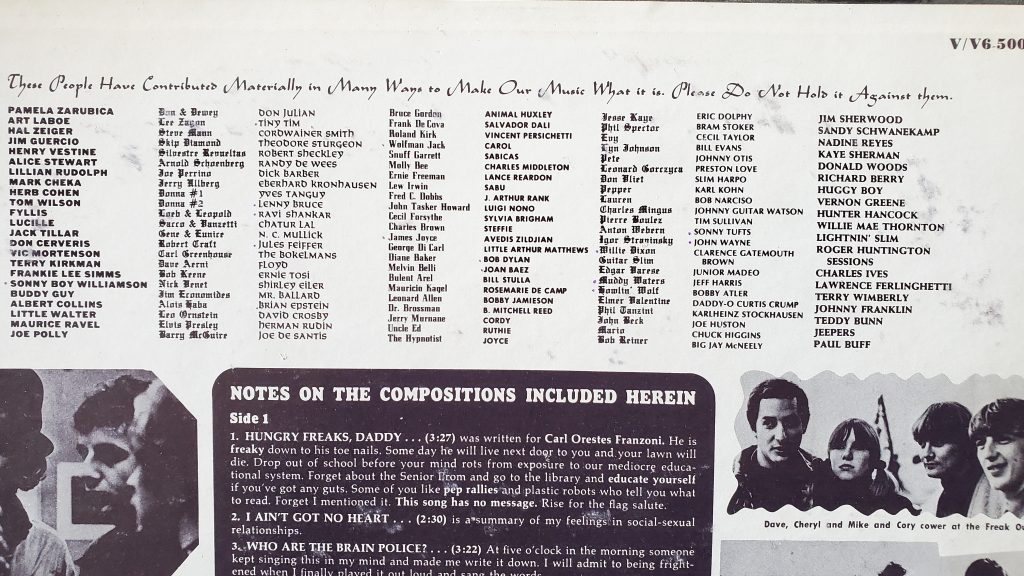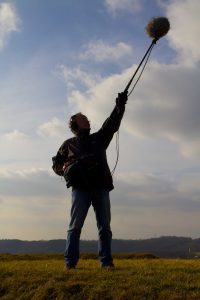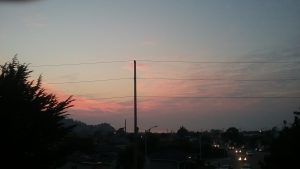I don’t remember exactly how this came up. It was probably related to all the contact with relations that Sepi had on Nowrooz.
She was aware of my cousins in Germany. I had told her of my trip there in 2017 and I had said that any trip we would take to Europe would have to include a visit with them.
Just the other day, she was asking what was the exact relationship that I had with these people so I told her about how Zacharias Hangauer had left Germany and came to America in 1869, married and had a family that included my grandmother. This led naturally to questions about how I knew of the German relatives.
I was astounded that I hadn’t told her the story before. It is one of my all-time favorites.
I present it here in full.
My Search For Unknown Kin
by Bernard J. Wood
How it Came About
In September 1975, I had the opportunity to attend a conference on surface science held at the University in Namur, Belgium. Nancy and I had often talked about visiting Europe, and this seemed to be the time to make our oft-discussed visit a reality. A three-week visit was reasonable, within the constraints of our family responsibilities and our financial resource. The conference in Namur occupied two weeks, so we had one full week to do sightseeing on our own in Western Europe.
When we looked at the travel guides and maps we realized that 52 weeks would hardly be enough to visit every place we wanted to see! We had to make the hard decision to limit our excursion to a few places. The principal limitation became geography; we didn’t want to spend all of our time traveling, so we chose three places that were reasonably close together, yet had some special meaning for us.
We selected Amsterdam, because two friends live there; one is a young woman, Johanna (Honny) M., who was an exchange student in our community a number of years ago; the second is Rutger van S. (and his family) who spent a year at SRI as a visiting scientist.
We chose Paris for the same reason: George A. is an old friend from SRI, and Mike and Trish C. and their family moved away from our parish in the middle ‘60’s. And besides, everyone wants to see Paris!
Our third choise was somewhat off-beat and very personal. The twin towns of Berkastel-Kues, located on the Mosel River in Germany, were the home of my ancestors in my mother’s family. I knew from conversations with my late Aunt Elizabeth that my grandfather Hangauer had emigrated from Bernkastel-Kues sometime around the middle of the 19th century. Indeed, Elizaceth had given me and old souvenir book of the Mosel Valley which showed photographs of Bernkastel-Kues. We had no inkling that any living kin resided in this region at the present time, for noe of my aunts in the American Hangauer line, whom I had know, had ever mentioned the existence of living relatives in Germany. Nevertheless, the reasonably convenient location of Bernkastel-Kues and its connection with my ancestors compelled us to include it in our itinerary.
The Journey to Bernkastel-Kues
On Tuesday morning, September 16, we boarded the Lorelei Express in Amsterdam and commenced a four-hour rail journey into Germany to Koblenz, where the Mosel flows into the Rhine. There we transferred to a Paris-bound train that took us west to the town of Wengerohr, where we again changed trains, this time to an inter-urban type of local that terminated its run in Bernkastel-Kues.
Bernkastel-Kues are twin towns situated on opposite banks of the Mosel, and connected by a bridge. Both are nestled into the hillsides that rise rather steeply from the river’s edge. The vineyards that cover the hills reveal the principal industry of these towns; winemaking. The second industry is tourism. Bernkastel-Kues is a resort area where people come to hike, breathe the fresh air and relax in the sun. the towns have the appearance of classic Alsatian villages, with narrow, winding, cobblestone streets lined with gabled houses constructed of wood and masonry. The village square in Bernkastel looks as if it might have been designed and built by Walt Disney; a perfect stereotype and perfectly charming!
We stayed in a hotel in Bernkastel called Doktor-Weinstuben. The name had nothing to do with the medial arts; it referred to a tavern wherein the famous Bernkasteler-Doktor wine was kept and served!
The Search
We spent the evening exploring the town and the shops. Next morning we inquired of the hotel clerk about the name Hangauer. He indicated there were people with that name in town, but he didn’t know whether they had been around very long, or if they had any connection with Hangauers in America. He suggested we visit a famous historical library in Kues, called the Cusanus Stift, where we might obtain some genealogical information. Unfortunately, the Cusanus Stift was not open until 3:00 p.p., so we had to pursue our inquiry through another channel.
Examination of the street map of the town revealed a number of churches with adjacent graveyards. We walked to the nearest one and looked for the name Hangauer on the grave markers. But we drew a blank. So we walked a few blocks to the next churchyard, St. Briktius, and repeated our scan. Here we found a simple wooden cross with the inscription “Hans Jos. Hangauer”.
The pastor’s house was the next logical place to visit, but the location wasn’t obvious. There was no indication of the priest’s residence in the vestibule of the church. We stepped out onto the street and looked about. Houses and small stores, but no sign or symbol that would identify a parsonage was in view. A woman, however, was leaning out a first stroey window of a nearby house. I approached her. “Guten morgan, meine Frau. Bitte, wo ist das Hause auf der Pastor?”, I said in my rudimentary German. The woman understood me, however, and spewed-out directions in a cascade of words, only a few of which I understood. “Langsam, langsam”, I pleaded, and she repeated her directions more slowly, pausing at strategic points to make sure I understood. “ Auf den Strasse, lenks . . . , richt, . . . ober den Eisenbahn . . .”
It was several blocks distant, and after we had come to the vicinity of the house, we were still unable to identify it. A young mother with two children in tow, approached us on the street. I repeated my inquiry to her. She nodded, then directed her smaller child to take us to the pastor’s house, which turned out to be just a half-block away. We rewarded the young guide with a coin, then rang the bell. The priest came to the door. “Sprechen Sie Anglais?” “Nicht.”
Ach! So I launched into my inquiry with what surely was quite vulgar German: “Meine Name ist Bernard Wood. Ich auf Amerika gekommt. Die Name auf meine Mutter ‘Hangauer’ war, und ihr Vater auf Bernkastel-Kues in achtzehn-hundert-sechzig or siebenzig getreben . . .” The pastor listened patiently, then invited us in. He went to a file and removed a few cards. Then he explained that although he had several Hangauers in his parish, he had no idea whether they were related to a person who emigrated to America in the mid-nineteenth century. However, there were tow sisters, unmarried, who were born around the turn of the century and would surely be able to remember if an uncle had emigrated to the USA. He gave us their names, Anna and Cilli Hangauer, and directed us to their home, just a few blocks away. We thanked him and proceeded directly to Goethestrasse 24.
The Discovery
The bell brought a white-haired woman to the door. I began again my spiel, prefacing my inquiry with Pastor Störmer’s name to lend some kind of respectability to my presence at her door. The woman was not impressed, and with a puzzled look protested that she knew of no relatives living in America. I had decided that my inquiry was futile, that there was no connection between these Hangauers and my grandfather. But before leaving I made a final effort to clarify when and where my grandfather emigrated to the USA. “Aber, meine Grossvater nach Amerika in achtzehn hunderd-siebenzig, in dem Stadt Buffalo in New York getreben!” Just as I was speaking this sentence, the other sister appeared in the front hall. At the word “Buffalo” her face lit up and she rushed to the door. “Buffalo, New York. Ja, ja! Zacharias Hangauer. Ja, ja! Kommen Sie in das Haus!” Then she ran back into the house and up the stairs. Her sister seemed rather bewildered, but led us into the parlor. In a moment, the second sister was back with a box of old letters and photographs. She held up a tintype-like portrait of an old man with a beard. I had seen the very same picture many times before – it was Grandfather Hangauer! Another photo came out of the box: young woman in a white dress. It was my mother, Rose Hangauer, and the picture was a duplicate of a portrait we keep in our own family archives! “Ja, meine Mutter!” I was so excited I could hardly believe the experience was real. I looked at Nancy to verify that we were awake and not dreaming. The Hangauer sisters were likewise excited. Anna spoke rapidly with great animation, and I had to beg her repeatedly to speak slowly. After a short time we settled down to a more calm demeanor, and spoke of many things: about our own family; about the other Hangauer descendants now living in America, and those presently living in various places in Germany; about the beautiful Mosel Valley; about the war (W.W. II) and how it affected the residents of Bernkastel-Kues; about the house in which Cilli and Anna lived, which had been built by their Grandfather Andreas.
Andreas and Zacharias Hangauer were brothers. Andreas’s son, also named Andreas, was born in the same year that Zacharias emigrated to America, 1869. the younger Andreas had 11 children, several of whom still live in various places in West Germany. Four of these children, Hans, Karl, Anna and Cilli, remained in Bernkastel-Kues.
Anna an Cilli served us a luncheon of schwarzbrot, cheese and wine, then showed us their home and garden. We departed from them to take a hike to the castle, Berg Landshut, after promising to return in the evening for supper.
The walk to Burg Landshut on top of the hill above the town was glorious. The day was warm and sunny. The vineyards were in full fruit, as the grape harvest had not yet taken place. And the view of the town and the valley from the castle was magnificent. The ruins of the castle were occupied by a restaurant, so we drank a glass of beer to quench the thirst we had developed during the climb, then returned to the town.
We rang the bell at Goethestrasse 24 about 6:30 p.m. Anna ushered us to their studio dining room and we enjoyed a hearty German meal. Shortly after dinner, Hans Hangauer and his wife, Helena (called Leni), arrived, and we spent a couple of hours looking at old photographs and talking about the Hangauer clan. Hans had cataloged a great deal of information about our ancestors, but he had few facts about the descendants of the American emigre. I was able to supply some information to him. He presented me with copies of letters that Zacharias Hangauer had sent from America to his relatives in Bernkastel-Kues. One of them was written on the day he arrived in New York; a second many years later when he traveled by train to the West Coast.
We then left the home of Anna and Cilli, and walked to Hans’ home. Here we met the youngest son of Hans and Leni: Franz. Franz is a student in his last year at the gymnasium (grade 13 by comparison with U.S. schools), and he spoke English quite fluently. Hans brought out the fine Mosel wine, and we imbibed freely while telling about our children, our experiences and our plans. Franz would like to visit America when he completes his studies next Spring, and we encouraged him to come. We offered him the hospitality of our own home in Northern California, and we suggested that Hangauer descendants located in Buffalo, Denver, and Southern California might be willing to be hosts to him also.
Hans is a civil servant and before we left he presented us with a bottle of fine Kardinalsburg wine to take home. As the hour grew late, we bade goodnight to the Hangauers and thanked them for their kind hospitality. Hans walked with us to our own hotel and pointed out a number of places of interest in the town. Filled with fine wine and warm with gemütlichkeit, we slept soundly.
Our Departure
Our schedule called for us to arrive in Paris the next day, so on Thursday morning we packed our bags, checked out of the hotel and went to the bus stop to meet and board the bus to Luxembourg, where we would transfer to an express train to Paris. Before the bus came, I walked to the post office to mail some post cards, and enroute was intercepted by Cilli. She greeted me and presented me with a small package to take home. The package contained a small basket, a hand-made linen doily, a piece of home-baked bread, and a picture of Grandfather Hangauer. We said good-bye, and I felt sad that our encounter had been so short, yet grateful that we had met at all under such improbable circumstances.
Before the bus arrived, Leni walked to the busstop. She had come downtown to do some shopping and stopped to say good-bye again to us. As the bus pulled away, we waved farewell. What a remarkable experience we had! Leaving Bernkastel-Kues was almost like awakening from a dream. Like Brigadoon, Bernkastel-Kues seemed like a place in a fantasy; something that came into existence just for us, and then disappeared forever into the mists.
Epilogue
Bernkastel-Kues and the Hangauers live! Shortly after we returned home, our cousin and neighbor, Mary S. (a great grand-daughter of Zacharias Hangauer) learned she would be sent to Stuttgart, Germany, for a business trip of about a month’s duration. She corresponded with the Hangauers in Bernkastel-Kues, and they invited her to come to visit them. She is now in Germany, and she plans to spend Christmas holidays with the Hangauers in Bernkastel-Kues.



